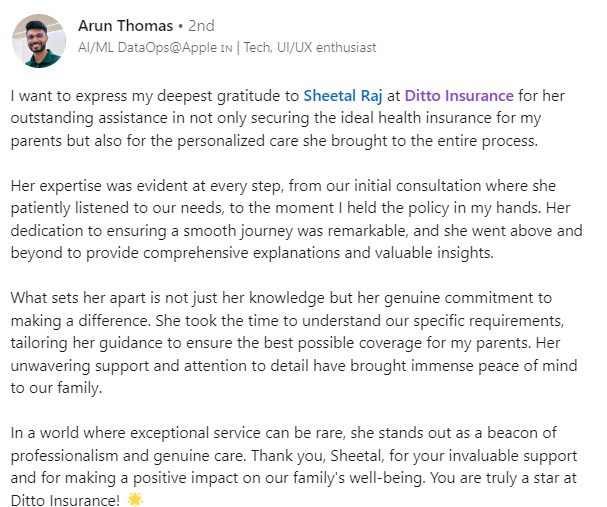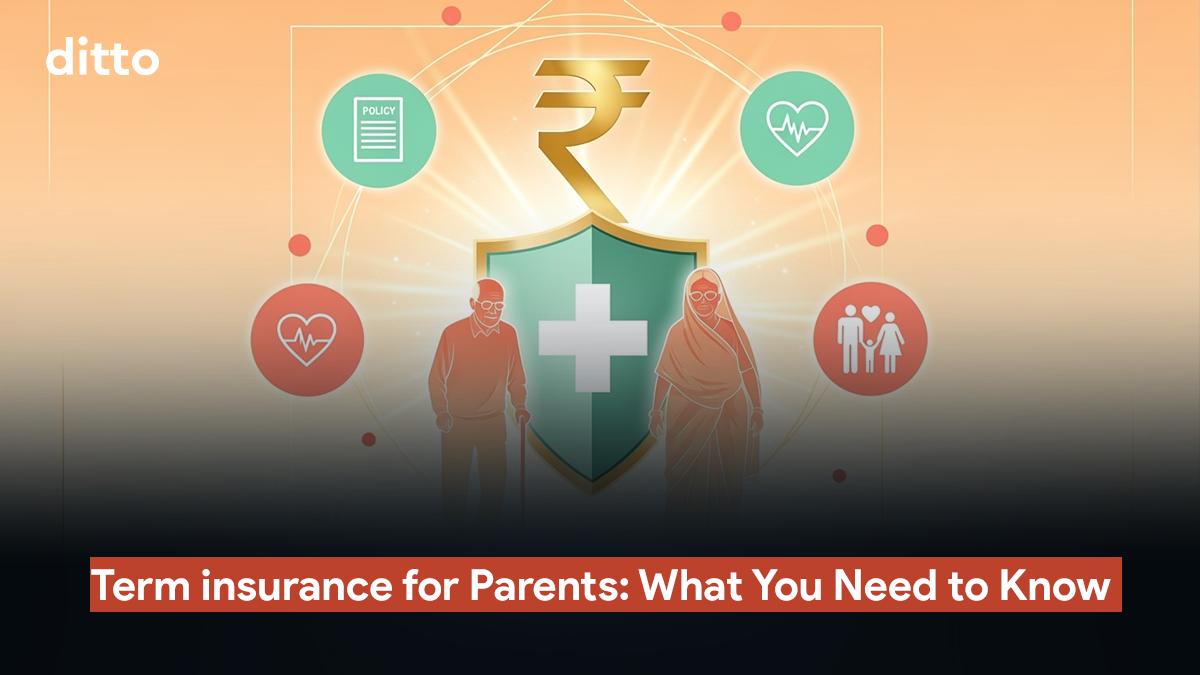| What Is Term Insurance for Parents? Term insurance for parents is a life insurance policy where the parent is the life insured, and a family member (usually the child) is the nominee. In the event of the parent's death during the policy term, the nominee receives a lump-sum payout. This cover is designed to provide financial protection if the parent has ongoing liabilities or dependents. However, due to factors like age, health conditions, and high premiums, buying term insurance for parents isn't always the most practical or cost-effective option for most families. |
Term insurance is usually seen as a smart financial move for young professionals, but not everyone is on board. Only 19% of Gen Z have considered buying term insurance, compared to 35% of Millennials.
But what if you're thinking about it, not for yourself, but for your parents? At Ditto, we help you understand when purchasing a term plan makes sense and when it might not. Let's break it down.
| Did You Know? IRDAI mandates that the minimum age to buy term insurance is 18 years, and the maximum entry age is 65 in its standard product - Saral Jeevan Bima. The policy term ranges from 5 to 40 years. Life insurers tend to replicate this base structure in their term insurance offerings as well. |
Choose financial tools based on logic, not emotion. Still unsure? Book a free call with Ditto’s advisors to find a plan that fits your needs.
Should You Buy Term Insurance for Your Parents?
Buying term insurance for your parents may feel like a responsible step, but it's not always necessary or financially practical. If your parents are retired, have no financial dependents, or aren't earning, this core purpose often doesn't apply.
However, there are a few exceptions where getting a term policy for your parents might make sense:
- They are still earning and actively contributing to the household income
- They have dependent family members (such as a spouse, grandchild, or special needs sibling)
- They are repaying loans like a home loan, business loan, or personal debt
That said, purchasing term insurance for older individuals comes with significant drawbacks which include:
- High premium costs (loading charges) due to age and health risks
- Extensive medical tests (treadmill tests, ECG, 2D echo test) and strict underwriting procedures
- Low approval chances in case of pre-existing medical conditions
- A poor cost-to-benefit ratio, especially if financial risks are minimal
- Add-ons are not provided
Instead of a term plan, we recommend purchasing a comprehensive health policy for your parents as it covers rising medical expenses during their lifetime, while term plans offer no living benefits.
| Friendly Reminder: Before considering buying a term plan, check for your parents' LIC coverage, if any, as many parents prefer LIC (Life Insurance Corporation of India) over standalone term insurance plans. |
Factors to Consider When Buying Term Insurance for Parents
1. Age Limitations: Most insurers allow entry only up to age 60-65, and policies expire by 85. The older your parents are, the fewer options you’ll have.
2. Premium Cost: Premiums rise sharply with age because of the higher mortality risk for the insurer. For example, a ₹1 crore term plan for someone aged 60 may cost over ₹1 lakh annually, which may not be feasible for middle class families.
Let’s take a quick look at how term insurance premiums rise with age:
As you’ll see below, the cost of a ₹1 crore term insurance plan (till age 70, for a non-smoker male, including GST and excluding first-year discounts) increases sharply with age.
| Plan | Age 40 | Age 45 | Age 50 | Age 55 | Age 60 |
|---|---|---|---|---|---|
| HDFC Click 2 Protect Supreme | ₹29,821 | ₹38,708 | ₹53,127 | ₹65,981 | ₹85,831 |
| ICICI Iprotect Smart Plus | ₹28,163 | ₹36,591 | ₹48,888 | ₹78,247 | ₹1,03,529 |
| Axis Max Smart Term Plan Plus | ₹27,046 | ₹35,532 | ₹54,156 | ₹77,132 | ₹1,13,898 |
| Bajaj E-touch II | ₹25,850 | ₹38,215 | ₹53,943 | ₹71,799 | ₹92,731 |
3. Medical Tests and Underwriting: Older individuals are subject to detailed medical checks. If your parents have pre-existing conditions like diabetes, hypertension, high cholesterol , insurers may reject the application or raise the premium significantly.
4. Actual Need: Does your parent have active income or dependents? If not, a term policy might offer little to no real benefit.
5. Duration of Coverage: Avoid buying a long-term policy if the financial obligations don’t last beyond a few years. Paying for a policy you don’t need anymore isn’t a smart financial move.
6. Track record: Choose insurers with strong overall metrics such as a high Claim Settlement Ratio, a high Amount Settlement ratio, low complaint volumes, and robust solvency for reliable, financially secure coverage.
Ditto’s Take on Term Insurance for Parents
At Ditto, we don't recommend buying term insurance for your parents unless necessary. Here's why:
- High Premiums: Term plans become significantly more expensive as age increases.
- Strict Medical Checks: Older individuals face tougher medical underwriting, which can lead to rejections.
- Lower Value: A term plan offers low value compared to a decent health policy if your parents are retired or financially independent.
Instead, here's what we recommend:
- Buy a term plan for yourself if you're young and financially support your family.
- Lock in low premiums early and secure long-term protection at an affordable cost.
- Ensure family security without relying on high-cost, high-risk policies for aging parents.
Buying term insurance early, ideally in your late 20s or early 30s, means lower premiums, easier approvals, and fewer medical checks.
For example, a ₹1 crore cover may cost ₹12,000 at 25 but triple by 45. Plus, unlike health insurance, where costs rise with age, you lock in the premium for the entire term.
What Alternatives Can You Explore for Your Parents?
If your parents are over 50 or retired, term insurance may not be the best solution. Instead, consider the following alternatives:
- Health Insurance: Medical expenses are a more immediate concern for seniors. A comprehensive health policy can ease the financial burden of hospitalizations.
- Fixed Deposits or Senior Citizen Savings Schemes (SCSS): These offer stable, low-risk returns and can be used to fund regular living, medical & travel expenses or provide stable income.
- Pension Plans or Annuities: These provide a guaranteed monthly income for life and help maintain financial independence.
- Emergency Fund: Build a separate corpus in the form of mutual funds or bank savings to cover unexpected expenses.
Pro Tip: Instead of paying high premiums for uncertain benefits, these alternatives offer more control, reliability, and peace of mind. Always align financial products with actual needs.
Why Talk to Ditto for Your Health Coverage?
At Ditto, we’ve assisted over 7,00,000 customers with choosing the right insurance policy. Why customers like Arun below love us:

✅No-Spam & No Salesmen
✅Rated 4.9/5 on Google Reviews by 12,000+ happy customers
✅Backed by Zerodha
✅100% Free Consultation
You can book a FREE consultation. Slots are running out, so make sure you book a call now!
Term Insurance for Parents: Key Takeaways
Term insurance for parents may seem thoughtful, but it often lacks real value, especially if they’re retired, debt-free, or have no financial dependents. Instead of paying high premiums for limited benefit, consider these practical alternatives that directly address their needs:
- Buying a term plan for yourself if you support the family
- Senior Citizen Savings Scheme (SCSS) or fixed deposits for steady, low-risk returns
- Pension or annuity plans for regular income
- An emergency fund for unforeseen expenses
Choose financial tools based on logic, not emotion. Still unsure? Book a free call with Ditto’s advisors to find a plan that fits your needs.
FAQs
Can I buy term insurance for my parents?
Yes, but they must consent and clear medical tests. Premiums are also much higher with age.
Is term insurance after 60 worth it?
Usually not, unless there are active financial responsibilities or liabilities.
What’s the best age to buy term insurance?
Ideally in your 20s or early 30s when premiums are lowest.
Is health insurance more important for parents?
Yes. Medical expenses are more common and urgent in old age.
Can I buy term insurance for my parents without medical tests?
No, insurers require medical tests for applicants over 50, especially for higher coverage.
Last updated on:










